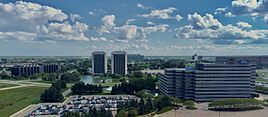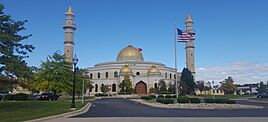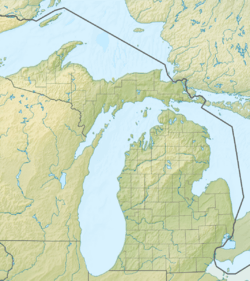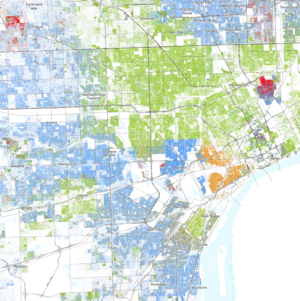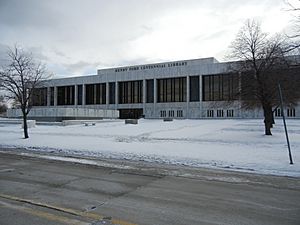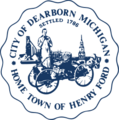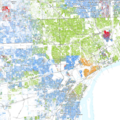Dearborn, Michigan facts for kids
Quick facts for kids
Dearborn, Michigan
|
|||
|---|---|---|---|
|
Skyline of Dearborn with the Parklane Towers
Ford World Headquarters
Islamic Center of America
|
|||
|
|||
| Motto(s):
"Home Town of Henry Ford"
|
|||
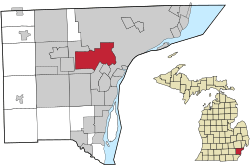
Location within Wayne County, Michigan
|
|||
| Country | United States | ||
| State | Michigan | ||
| County | Wayne | ||
| Settled | 1786 | ||
| Incorporated | 18931893 (village) 1927 (city) |
||
| Government | |||
| • Type | Mayor–council | ||
| Area | |||
| • City | 24.52 sq mi (63.49 km2) | ||
| • Land | 24.25 sq mi (62.80 km2) | ||
| • Water | 0.27 sq mi (0.69 km2) | ||
| Elevation | 591 ft (180 m) | ||
| Population
(2020)
|
|||
| • City | 109,976 | ||
| • Density | 4,535.65/sq mi (1,751.25/km2) | ||
| • Metro | 4,285,832 (Metro Detroit) | ||
| Time zone | UTC−5 (EST) | ||
| • Summer (DST) | UTC−4 (EDT) | ||
| ZIP code(s) |
48120, 48121, 48123, 48124, 48126, 48128
|
||
| Area code(s) | 313 | ||
| FIPS code | 26-21000 | ||
| GNIS feature ID | 0624432 | ||
Dearborn is a city in Wayne County, Michigan, United States. It's a suburb of Metro Detroit, located just west of downtown Detroit. In 2020, about 109,976 people lived there, making it the seventh-largest city in Michigan.
Dearborn is famous as the hometown of the Ford Motor Company and its founder, Henry Ford. The city was first settled in the 1700s by French Canadians. They called it "La Belle Fontaine" because of its many springs. Later, it was named Springwells, an English version of the French name.
The city grew in the 1800s with the building of the Detroit Arsenal. This connected Detroit and Chicago. In the 1900s, Dearborn became a major center for making cars.
Henry Ford was born on a farm that used to be in Dearborn. He later built his home, Fair Lane, and his huge River Rouge Complex factory here. Ford created the idea of mass production for cars. The world headquarters of the Ford Motor Company is still in Dearborn.
The city is also home to a campus of the University of Michigan and Henry Ford College. The Henry Ford museum complex is the largest indoor-outdoor history museum in the U.S. It is a top tourist spot in the Detroit area.
Many people in Dearborn have European or Middle Eastern family backgrounds. Some came from Germany, Poland, Ireland, and Italy long ago. More recently, many immigrants came from the Middle East. These include people from Lebanon, Palestine, Syria, Iraq, and Yemen. Dearborn has the largest percentage of Muslim people in the U.S. It also has the largest mosque in North America. In 2023, Dearborn became the first U.S. city where most residents (55%) said they were of Middle Eastern or North African descent.
Contents
- Discovering Dearborn's Past
- Exploring Dearborn's Landscape
- Dearborn's Weather Patterns
- Understanding Dearborn's People
- Dearborn's Economy and Jobs
- Learning and Education in Dearborn
- Arts, Culture, and Fun in Dearborn
- Media in Dearborn
- Timeline of Dearborn's Growth
- Famous People from Dearborn
- Images for kids
- See also
Discovering Dearborn's Past
Before Europeans arrived, the Dearborn area was home to Native American tribes for thousands of years. These included the Potawatomi and Huron tribes. French settlers built a trading post in Detroit and farms in Dearborn during the colonial period. After the Seven Years' War, France gave its land to Great Britain in 1763.
After the American Revolutionary War, more European Americans moved to the Detroit and Dearborn areas. In 1833, Dearborn Township was formed. The village of Dearbornville was created in 1836. Both were named after Henry Dearborn, a general and Secretary of War. The Town of Dearborn became a city in 1893. For much of the 1800s, the area was mostly farmland.
In 1927, Dearborn officially became a city. Its current size comes from a 1928 vote. This vote merged Dearborn with a nearby area called Fordson. Fordson was worried about being taken over by the growing city of Detroit.
Historically, some leaders in Dearborn tried to prevent African Americans from living in the city. This was part of a wider issue of segregation in the U.S.
Henry Ford bought much of the undeveloped land between Dearborn and Fordson. He used it for his home, Fair Lane, and for the Ford Motor Company World Headquarters. Later, this land also became home to the Ford airport (now the Dearborn Proving Grounds) and other Ford buildings.
Newer additions to Dearborn include The Henry Ford museum, the Henry Ford Centennial Library, and the Fairlane Town Center shopping mall. The Arab American National Museum (AANM) opened in 2005. It is the first museum in the world dedicated to Arab American history and culture.
Exploring Dearborn's Landscape
According to the United States Census Bureau, Dearborn covers about 24.5 square miles (63.49 km2). Most of this is land, with a small amount of water. The city is built on both sides of the Rouge River. Henry Ford built a small dam on his estate to power a building. The different branches of the river meet in Dearborn. The river is made wider near the Ford Rouge Plant so large ships can use it.
Fordson Island is an 8.4-acre (3.4 ha) island in the River Rouge. It was created in 1922 to help ships navigate the river. The island is privately owned and has no public access.
Dearborn also owns Camp Dearborn in Milford, Michigan. This camp is about 35 miles (56 km) from Dearborn. It is considered part of the city. Money earned from camp admissions helps the city's budget.
Dearborn's Weather Patterns
Dearborn has a typical Midwest climate. It experiences warm summers and cold, snowy winters.
| Climate data for Dearborn, Michigan (1991–2020 normals, extremes 1952–present) | |||||||||||||
|---|---|---|---|---|---|---|---|---|---|---|---|---|---|
| Month | Jan | Feb | Mar | Apr | May | Jun | Jul | Aug | Sep | Oct | Nov | Dec | Year |
| Record high °F (°C) | 65 (18) |
71 (22) |
86 (30) |
90 (32) |
95 (35) |
104 (40) |
102 (39) |
102 (39) |
100 (38) |
91 (33) |
77 (25) |
69 (21) |
104 (40) |
| Mean daily maximum °F (°C) | 32.0 (0.0) |
34.9 (1.6) |
45.2 (7.3) |
58.3 (14.6) |
70.0 (21.1) |
79.2 (26.2) |
83.6 (28.7) |
81.8 (27.7) |
75.1 (23.9) |
62.1 (16.7) |
48.3 (9.1) |
36.9 (2.7) |
58.9 (14.9) |
| Daily mean °F (°C) | 24.8 (−4.0) |
27.0 (−2.8) |
35.8 (2.1) |
47.6 (8.7) |
58.8 (14.9) |
68.5 (20.3) |
72.8 (22.7) |
71.3 (21.8) |
64.3 (17.9) |
51.9 (11.1) |
40.3 (4.6) |
30.5 (−0.8) |
49.5 (9.7) |
| Mean daily minimum °F (°C) | 17.7 (−7.9) |
19.1 (−7.2) |
26.4 (−3.1) |
36.9 (2.7) |
47.5 (8.6) |
57.8 (14.3) |
62.0 (16.7) |
60.8 (16.0) |
53.4 (11.9) |
41.6 (5.3) |
32.3 (0.2) |
24.0 (−4.4) |
40.0 (4.4) |
| Record low °F (°C) | −20 (−29) |
−14 (−26) |
−9 (−23) |
10 (−12) |
23 (−5) |
36 (2) |
41 (5) |
40 (4) |
29 (−2) |
19 (−7) |
4 (−16) |
−9 (−23) |
−20 (−29) |
| Average precipitation inches (mm) | 2.51 (64) |
2.27 (58) |
2.29 (58) |
3.26 (83) |
3.60 (91) |
3.28 (83) |
3.54 (90) |
3.23 (82) |
3.01 (76) |
2.87 (73) |
2.74 (70) |
2.45 (62) |
35.05 (890) |
| Average snowfall inches (cm) | 11.7 (30) |
7.3 (19) |
5.7 (14) |
0.6 (1.5) |
0.0 (0.0) |
0.0 (0.0) |
0.0 (0.0) |
0.0 (0.0) |
0.0 (0.0) |
0.0 (0.0) |
0.9 (2.3) |
4.6 (12) |
30.8 (78) |
| Average precipitation days (≥ 0.01 in) | 11.8 | 9.3 | 9.4 | 11.9 | 12.3 | 10.1 | 10.2 | 9.5 | 9.2 | 11.6 | 10.4 | 11.5 | 127.2 |
| Average snowy days (≥ 0.1 in) | 6.7 | 5.2 | 2.8 | 0.4 | 0.0 | 0.0 | 0.0 | 0.0 | 0.0 | 0.0 | 1.0 | 4.5 | 20.6 |
| Source: NOAA | |||||||||||||
Understanding Dearborn's People
Dearborn's population has grown over the years. In 2020, it reached nearly 110,000 people.
| Historical population | |||
|---|---|---|---|
| Census | Pop. | %± | |
| 1860 | 355 | — | |
| 1870 | 530 | 49.3% | |
| 1880 | 410 | −22.6% | |
| 1900 | 844 | — | |
| 1910 | 911 | 7.9% | |
| 1920 | 2,470 | 171.1% | |
| 1930 | 50,358 | 1,938.8% | |
| 1940 | 63,589 | 26.3% | |
| 1950 | 94,994 | 49.4% | |
| 1960 | 112,007 | 17.9% | |
| 1970 | 104,199 | −7.0% | |
| 1980 | 90,660 | −13.0% | |
| 1990 | 89,286 | −1.5% | |
| 2000 | 97,775 | 9.5% | |
| 2010 | 98,153 | 0.4% | |
| 2020 | 109,976 | 12.0% | |
| U.S. Decennial Census 2018 Estimate |
|||
Diverse Communities in Dearborn
Dearborn is known for its diverse population. Many residents are descendants of European immigrants from the 1800s and 1900s. These include people of Irish, German, Italian, and Polish heritage. There is also a community of people from Malta.
The city has a small African-American population. Their ancestors often moved to the area from the Southern U.S. for jobs in the early 1900s.
Dearborn has a very large community of Arab Americans. About 40,000 Arab Americans live in the city. This is the largest percentage of Arab Americans in any U.S. city. Many have been in Dearborn since the early 1900s. The largest group is Lebanese American.
The first Arab immigrants came in the early 1900s to work in the car industry. Many were Lebanese Christians. Later, more immigrants came from Yemen, Iraq, and Palestine. Most of these newer immigrants are Muslim.
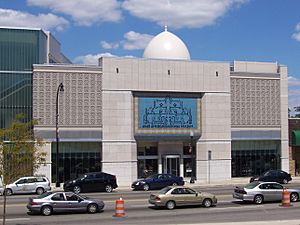
The Arab-American community has built important places like the Islamic Center of America. This is the largest mosque in North America. The Arab American National Museum opened in 2005. It celebrates the history and culture of Arab Americans.
Dearborn's Economy and Jobs
The world headquarters of Ford Motor Company is in Dearborn. Ford has many research, testing, and production facilities here. Ford Land manages the many properties owned by Ford. This includes selling or leasing land to other businesses, like the Fairlane Town Center mall. DFCU Financial is a large credit union for Ford employees.
Other big employers in Dearborn include Beaumont Health and Dearborn Public Schools. Auto suppliers like Visteon also have a presence. Education facilities like Henry Ford College and museums like The Henry Ford provide many jobs. Other companies based in Dearborn include Carhartt (clothing) and AAA Michigan (insurance).
Top Employers in Dearborn
Here are some of the largest employers in Dearborn:
| # | Employer | # of employees |
|---|---|---|
| 1 | Ford Motor Company | 43,080 |
| 2 | Beaumont Health | 7,883 |
| 3 | School District of the City of Dearborn | 2,283 |
| 4 | AAA Michigan | 1,316 |
| 5 | Cleveland Cliffs - Dearborn Works | 1,290 |
| 6 | City of Dearborn | 1,068 |
| 7 | The Edison Institute (Henry Ford) | 747 |
| 8 | Carhartt Inc. | 616 |
| 9 | Hollingsworth Logistics Group | 550 |
| 10 | Ghafari Inc. | 442 |
Learning and Education in Dearborn
Dearborn offers many educational opportunities for students.
Colleges and Universities
- University of Michigan–Dearborn
- Henry Ford College
- Concordia University Dearborn Center
- Central Michigan University (offers classes)
Schools for All Ages
Most Dearborn residents attend Dearborn Public Schools. This system has 34 schools, including three main high schools:
- Fordson High School
- Dearborn High School
- Edsel Ford High School
The public schools serve over 18,000 students. This makes it the fourth-largest school district in Michigan.
There are also private schools:
- Divine Child High School and Elementary School
- Henry Ford Academy (a charter high school inside Greenfield Village)
- Advanced Technology Academy (another charter school)
- Muslim American Youth Academy (MAYA), run by the Islamic Center of America
- Sacred Heart Elementary School, run by the Roman Catholic Archdiocese of Detroit
- Riverside Academy Early Childhood Center, East Campus (K-5), and West Campus (6–12)
Public Libraries
The Dearborn Public Library system includes:
- Henry Ford Centennial Library (main library)
- Bryant Branch
- Esper Branch
The first public library opened in 1924. The Henry Ford Centennial Library opened in 1969. It was built with a $3 million gift from the Ford Motor Company to honor Henry Ford.
Arts, Culture, and Fun in Dearborn
Dearborn has many places to explore art, history, and culture.
Museums to Visit
- Arab American National Museum
- Automotive Hall of Fame
- The Henry Ford (Henry Ford Museum & Greenfield Village)
- Fair Lane Estate
- Dearborn Historical Museum
- The Stamelos Gallery at the University of Michigan Dearborn Mardigan Library
- The Alfred Berkowitz Gallery at the University of Michigan Dearborn Mardigan Library
Parks for Outdoor Fun
- Crowley Park and Field
- Ford Field Park
- Ford Woods Park
- Hemlock Park
- Levagood Park
- Rouge Gateway Park / Trail
Theaters for Entertainment
- Ford Community & Performing Arts Center
- Ford-Wyoming Drive-In
Unique Architecture
Dearborn has many interesting buildings. Some were designed by architect Albert Kahn for Henry Ford.
- Edward Hotel & Convention Center
- Ford Motor Company Research and Engineering Center
- Ford World Headquarters building
- Ford Homes Historic District
- Islamic Center of America
- Dearborn Inn
- Ford Engineering Laboratory
- Ford River Rouge Complex
Media in Dearborn
Local news for Dearborn is covered by:
- The Detroit News
- Detroit Free Press
- Dearborn & Dearborn Heights Press and Guide
- The Arab American News (published in Dearborn)
Timeline of Dearborn's Growth
This timeline shows key moments in Dearborn's history.
Early Settlements and Changes
- 1701: French explorers first land near what is now Detroit.
- 1760: The British take control of the area from France.
- 1786: The first permanent settler arrives in present-day Dearborn.
- 1796: Wayne County is formed.
- 1805: Michigan Territory is created.
- 1826: Conrad Ten Eyck builds Ten Eyck Tavern.
- 1833: Dearborn Township is created. The Detroit Arsenal is built.
- 1837: Michigan becomes the 26th state. The Michigan Central Railroad extends through the area.
- 1838: The Village of Dearbornville is incorporated.
Becoming a Village and City
- 1893: The Village of Dearborn officially incorporates.
- 1916: Henry, Clara, and Edsel Ford move to Dearborn.
- 1917: The Rouge "Eagle" Plant opens.
- 1919: Springwells Township becomes the village of Springwells.
- 1924: Ford Airport opens.
- 1925: Springwells changes its name to the city of Fordson.
- 1927: The Village of Dearborn becomes a city.
- 1928: Dearborn, Fordson, and part of Dearborn Township merge into one city.
- 1929: Henry Ford Museum and Greenfield Village opens.
- 1931: Dearborn Inn opens.
- 1932: The Ford Hunger March happens.
- 1941: Ford Motor Company signs its first union contract.
- 1947: Henry Ford dies. Ford Airport officially closes.
- 1947: Camp Dearborn is purchased.
- 1959: University of Michigan (Dearborn Campus) opens.
- 1960: The remaining parts of Dearborn Township become Dearborn Heights, Michigan.
- 1962: New Henry Ford Community College campus is dedicated.
- 1976: Fairlane Town Center opens.
- 2005: The Arab American National Museum opens.
Famous People from Dearborn
Many interesting people have connections to Dearborn.
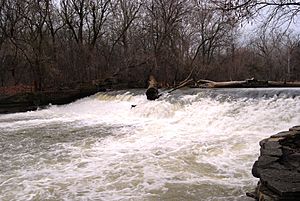
- Myles Amine – Olympic bronze medalist in wrestling.
- Frankie Andreu – Professional cyclist.
- Anthony Bass – Pitcher for the Miami Marlins.
- Dave Brandon – CEO of Toys "R" Us.
- Brian Calley – Former Lieutenant Governor of Michigan.
- Garrett Clayton – Actor.
- John Dingell – Longest-serving Congressman in U.S. history.
- Rima Fakih – Miss USA 2010.
- Henry Ford – Founder of Ford Motor Company.
- Edsel Ford – Henry Ford's son and former president of Ford Motor.
- Dan Gheesling – Winner of Big Brother 10 (U.S.).
- Al Iafrate – NHL hockey player.
- Dakota Joshua – Professional ice hockey player.
- Ali Kabbani – Famous YouTube live streamer and professional gamer.
- Derek Lowe – Major League Baseball pitcher, 2004 World Series champion.
- Mei Lin – Chef, winner of Top Chef: Boston.
- Alan Mulally – Former CEO of Ford Motor Company.
- George Peppard – Film actor.
- Brian Rafalski – NHL hockey player.
- Robert Saleh – NFL Head Coach of the New York Jets.
- Norbert Schemansky – Four-time Olympic medalist in weightlifting.
- Serena Shim – Lebanese-American journalist.
Images for kids
-
Location within Wayne County, Michigan
-
Dearborn skyline with Ford River Rouge Complex in background, 1973
-
The Arab American National Museum is in Dearborn.
-
River Rouge from Henry Ford's estate
See also
 In Spanish: Dearborn (Míchigan) para niños
In Spanish: Dearborn (Míchigan) para niños
 | Bayard Rustin |
 | Jeannette Carter |
 | Jeremiah A. Brown |


